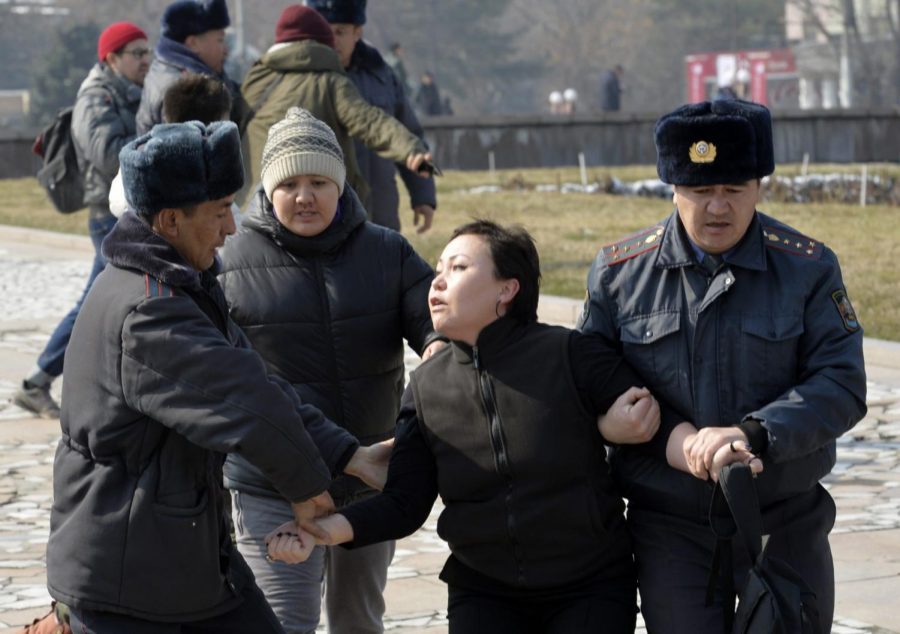Protests and celebrations mark Women’s Day, despite threats
Kyrgyz policemen detain an activist of the Femen women’s rights movement at Victory Square during celebration of the International Women’s Day in Bishkek, Kyrgyzstan, Sunday, March 8, 2020.
NEW YORK (AP) — From the streets of Manila to the plazas of Santiago, Chile, people around the world marked International Women’s Day on Sunday with calls to end exploitation and increase equality.
But tensions marred some celebrations, with police reportedly using tear gas to break up a demonstration by thousands of women in Turkey and security forces arresting demonstrators at a rally in Kyrgyzstan.
Turkish riot police tear gas to disperse thousands of demonstrators who, in defiance of a government ban, tried to march along Istanbul’s main pedestrian street to mark International Women’s Day, media reports said.
Turkish authorities declared Istiklal street, near Istanbul’s main Taksim square, off-limits, and said the planned march down the avenue was unauthorized. Several demonstrators were detained, according to Cumhuriyet.
In Pakistan, however, women managed to rally in cities across the country, despite petitions filed in court seeking to stop them. The opposition was stirred in part by controversy over a slogan used in last year’s march: “My Body, My Choice.”
Some conservative groups had threatened to stop this year’s marches by force. But Pakistani officials pledged to protest the marchers. The rallies are notable in a conservative country where women often do not feel safe in public places because of open harassment. The main Islamic political party, Jamaat-e-Islami, organized its own rallies to counter the march.
One of the largest demonstrations occurred in Chile, where crowds thousands flooded the streets of the capital with dancing, music and angry demands for gender equality and an end to violence against women.
“They kill us, they rape us and nobody does anything,” some chanted.
National police estimated 125,000 took part in the capital and nearly 35,000 in other cities, but organizers said the crowds were far larger. Scattered clashes broke out at points when demonstrators threw rocks at police, who responded with water cannons.
Many protesters demanded that a proposed new constitution strengthen rights for women and thousands wore green scarves in a show of support for activists in neighboring Argentina, which is considering a proposal to legalize elective abortion.
Tens of thousands of women also marched through Paris, inveighing against the “virus of the patriarchy.”
“Enough impunity!” chanted some activists, who focused on France’s unusually high rate of women killed by their husbands. Last year, one woman was killed every two or three days by a current or former partner, and the government is increasing efforts to crack down on domestic violence.
Thousands of women also marched in Madrid and other Spanish cities, despite concern over the spread of the new coronavirus.
Spanish health authorities said did not put any restrictions on the march, but recommended that anyone with symptoms similar to those of the coronavirus stay home.
At a school in East London, meanwhile, the duchess of Sussex, Meghan Markle, joined students in listening to speeches about women labor activists, and urged both girls and boys to respect the contributions of women every day of the year.
The detonation of explosives triggered panic at a ceremony in Bamenda, an English-speaking town in the northwest of Cameroon. Suspicions focused on separatists who had vowed to disrupt the events. No one was killed or wounded.
Police in Bishek, the capital city of Kyrgyzstan, detained about 60 people after a group of unidentified men broke up what authorities called an unauthorized rally.
Police said people from both sides were detained, but news reports said they were primarily women. They were released several hours later, after about 10 had been charged with resisting police, the Akipress news agency reported, citing an attorney.







